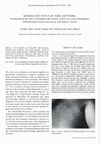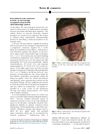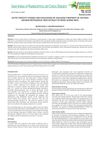32 citations,
May 2018 in “Journal of the American Academy of Dermatology” Skin reactions from cancer treatments might predict how well the treatments work.
 25 citations,
May 2018 in “Clinical & Translational Oncology”
25 citations,
May 2018 in “Clinical & Translational Oncology” New melanoma treatments can cause skin side effects, including skin cancer and rashes, but combining treatments may reduce these risks.
[object Object]  24 citations,
October 2016 in “Oncotarget”
24 citations,
October 2016 in “Oncotarget” Finasteride has a higher risk of reproductive side effects than minoxidil.
 20 citations,
September 2019 in “South African Journal of Botany”
20 citations,
September 2019 in “South African Journal of Botany” Teucrium polium extracts are non-toxic and effectively speed up wound healing.
 19 citations,
October 2008 in “Journal der Deutschen Dermatologischen Gesellschaft”
19 citations,
October 2008 in “Journal der Deutschen Dermatologischen Gesellschaft” Anti-cancer treatments can cause reversible hair loss, skin sensitivity, pigmentation changes, nail damage, and skin reactions, with a need for more research on managing these side effects.
15 citations,
May 1987 in “Fundamental and applied toxicology” SMR-2 and SMR-6 are much more toxic than retinoic acid, causing severe side effects.
15 citations,
January 2019 in “Breast care” Preventive measures and effective management are crucial for reducing skin side effects in cancer treatment.
 14 citations,
December 2007 in “Pediatric allergy and immunology”
14 citations,
December 2007 in “Pediatric allergy and immunology” Newborns with the common rash Erythema Toxicum have many active mast cells in their skin, but these cells don't produce the LL-37 peptide.
 14 citations,
April 2017 in “American Journal of Transplantation”
14 citations,
April 2017 in “American Journal of Transplantation” Skin problems from transplant drugs are common and need careful management in organ transplant patients.
13 citations,
July 2017 in “Annals of Oncology” Chemotherapy toxicity might be reduced by using DNA neutralizing agents.
12 citations,
May 2015 in “Journal of the National Comprehensive Cancer Network” Doctors should actively prevent and treat skin side effects in cancer patients to keep them on the best medication and reduce discomfort.
[object Object]  10 citations,
May 1978 in “Acta Dermato Venereologica”
10 citations,
May 1978 in “Acta Dermato Venereologica” Pustules in toxic erythema are linked to hair follicles or sweat ducts.
6 citations,
December 2014 in “PubMed” A supplement for hair loss with green tea in it may cause liver problems.
 5 citations,
May 2019 in “Journal of oceanology and limnology (Online)”
5 citations,
May 2019 in “Journal of oceanology and limnology (Online)” Ecklonia cava extract can reduce the damage and stress caused by hair dye.
 5 citations,
January 2018 in “Javma-journal of The American Veterinary Medical Association”
5 citations,
January 2018 in “Javma-journal of The American Veterinary Medical Association” A dog fully recovered from minoxidil poisoning after receiving treatment.
5 citations,
April 2014 in “Journal of Lipid Research” SCD1 inhibitors can cause skin issues in rodents.
 4 citations,
March 2012 in “Annals of oncology”
4 citations,
March 2012 in “Annals of oncology” New treatment with green tea polyphenols and nicotinamide improves skin problems from cancer therapy.
 4 citations,
March 2002 in “International journal of toxicology”
4 citations,
March 2002 in “International journal of toxicology” LAAM caused developmental toxicity in tolerant rats without causing birth defects.
 2 citations,
December 2022 in “Journal of toxicologic pathology”
2 citations,
December 2022 in “Journal of toxicologic pathology” Skin structure complexity and variability are crucial for assessing skin toxicity in safety tests.
 2 citations,
November 2018 in “JAAD case reports”
2 citations,
November 2018 in “JAAD case reports” Drinking kava tea can cause a skin reaction with red, swollen bumps, which may improve with steroids.
1 citations,
July 2021 in “Small ruminant research” Vitamin E, alone or with yeast, helped reduce arsenic poisoning effects in young goats.
 December 2024 in “Journal of Applied Toxicology”
December 2024 in “Journal of Applied Toxicology” High doses of dihydroartemisinin caused reversible liver toxicity in rats, with females more affected than males.
 September 2019 in “Asian Journal of Pharmaceutical and Clinical Research”
September 2019 in “Asian Journal of Pharmaceutical and Clinical Research” Teak seed extract is safe and reduces pain in mice.
 October 2004 in “Radiotherapy and oncology”
October 2004 in “Radiotherapy and oncology” Active vitamin D3 might protect hair follicles from radiation damage.
 January 2024 in “Reproductive toxicology”
January 2024 in “Reproductive toxicology” Hesperidin helps protect against testicular damage caused by finasteride.
 January 2018 in “Computational Toxicology”
January 2018 in “Computational Toxicology” Pharmacophore models can predict liver toxicity and central nervous system toxicity, but they have limitations and specific requirements.
January 2017 in “Elsevier eBooks” Radiation therapy for cancer often causes skin problems like redness, dryness, and pain.
September 2016 in “Case Reports in Internal Medicine” Chronic arsenic toxicity can cause diabetes and may not improve even with treatment.
 April 2015 in “Reactions Weekly”
April 2015 in “Reactions Weekly” Finasteride toxicity information is limited, poor quality, and biased.
 103 citations,
January 2009 in “Carbon”
103 citations,
January 2009 in “Carbon” Pure carbon nanotubes are safe for mice, but impure ones cause immune issues and hair loss.



















